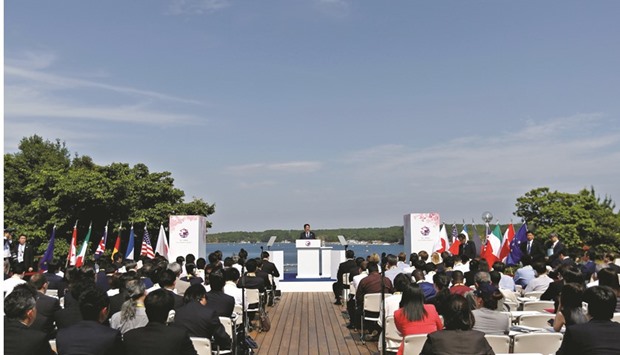Japanese Prime Minister Shinzo Abe failed in his bid to have Group of Seven leaders warn of the risk of a global economic crisis in a communique issued as their summit wraps up on Friday in central Japan.
The final statement declares that G7 countries “have strengthened the resilience of our economies in order to avoid falling into another crisis.”
Japan had pressed G7 leaders to note “the risk of the global economy exceeding the normal economic cycle and falling into a crisis if we did not take appropriate policy responses in a timely manner.” On Thursday, Abe presented documents to the G7 indicating there was a danger of the world economy careering into a crisis on the scale of the 2008 Lehman shock.
Abe has frequently said he would proceed with a planned increase in Japan’s sales tax in April 2017 unless there is an event on the scale of Lehman or a major earthquake. He is expected to announce next week he is deferring the tax rise, Japanese media reported.
One of the biggest topics at the meeting was China, which is not a member of the G7. A slowdown in China, alongside a global steel glut, has spurred concerns among developed economies and at times disagreement on how best to spur growth. Abe has advocated greater government spending to back up monetary policy action.
The communique urged a coordinated, albeit differentiated, response to storm clouds gathering over the global economy. Leaders pledged to use a mix of tools depending on their circumstances.
The G7 statement compromised on the austerity-versus-stimulus debate by leaving each country’s road map open – saying they will take “into account country-specific circumstances” as they move to use “all policy tools – monetary, fiscal and structural - individually and collectively to strengthen global demand and address supply constraints while continuing our efforts to put debt on a sustainable path.”
The need for fiscal measures and structural reforms was underscored with the statement saying that “monetary policy alone cannot lead to strong, sustainable and balanced growth.”
Asia is feeling the brunt of the Chinese slowdown given its trade exposure, with a more marginal impact so far on the US and Europe, said Glenn Maguire, Asia-Pacific chief economist at Australia & New Zealand Banking Group in Singapore.
“Hence it is not entirely surprising that a coordinated response to an unevenly felt dynamic could not be reached at the G7 negotiating table,” Maguire said. “Moreover, the G7 is obviously aware of the ‘announcement effect’ the official communique has,” he said. “In such a situation, warning of negative risks and sentiment can become self-fulfilling.”
The G7 leaders added in an 11th-hour warning on Brexit, saying the departure of the UK from the European Union would “reverse the trend towards greater global trade and investment and the jobs they create, and is a further serious risk to growth.” The warning was not included in the economy section of a working draft of the communique as of Thursday evening.
Further threats to the world economy include escalating geopolitical conflicts, terrorism and refugee flows, the communique says.
“The global recovery continues, but growth remains moderate and uneven, and since we last met downside risks to the global outlook have increased,” the statement says. “Weak demand and unaddressed structural problems are the key factors weighing on actual and potential growth.”
Leaders reaffirmed their commitment to market-determined exchange rates. They warned that “excess volatility and disorderly movements in exchange rates can have adverse implications for economic and financial stability.”
Trade is a key driver of growth, the communique says. It lauds the 12-nation Trans-Pacific Partnership trade pact as “an important step forward” and called on each country to “complete its domestic process,” while stopping short of a call to quickly ratify the agreement.
The pact has met delays in countries such as the US and Japan, while Canada has not committed to ratification.
Leaders said they will work toward an agreement in principle on the US-EU Transatlantic Trade and Investment Partnership as early as this year, while encouraging the EU and Canada to bring their trade pact into force as quickly as possible.

Japanese Prime Minister Shinzo Abe speaks at a news conference during the G7 summit in Ise-Shima. Japan had pressed G7 leaders to note the risk of the global economy exceeding the normal economic cycle and falling into a crisis if leaders did not take appropriate policy responses in a timely manner.
